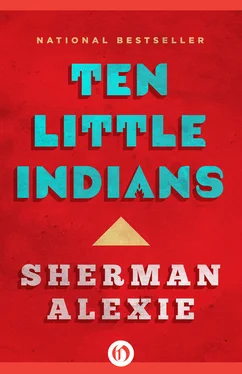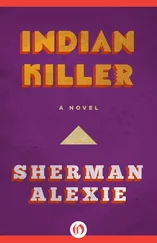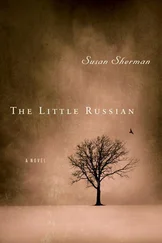Corliss reached across and took his hand. She hoped he wouldn’t interpret it as a sexual gesture. But he didn’t seem to notice or acknowledge her touch. He was too involved with his own story. He was confessing; she was his priest.
“Even though my poems were just my imagination,” he said, “just my dreams and ideas about what it would’ve been like to grow up Indian, these white people, they thought my poems were real. They thought I had lived the life I was writing about. They thought I was the Indian I was only pretending to be. After a while, I started believing it, too. How could I not? They wanted me to be a certain kind of Indian, and when I acted like that kind of Indian, like the Indian in my poems, those white people loved me.”
July 22, 1973. Seven-twenty-three P.M. Open-mike night at Boo’s Books and Coffee on University Way in Seattle. Harlan Atwater walked in with twenty-five copies of In the Reservation of My Mind. He’d printed three hundred copies and planned to sell them for five dollars each, fairly expensive for self-published poetry, but Harlan thought he was worth it. He’d considered bringing all three hundred copies to the open mike, but he didn’t want to look arrogant. He figured he’d quickly sell the twenty-five copies he had brought, and it would look better to sell out of his current stock than to have huge piles of unsold books sitting about. He didn’t need the money, but he didn’t want to give the books away. People didn’t respect art when it was free.
He was number twelve on the list of twenty readers for the night. That was good placement. Any earlier and the crowds would be sparse. Any later and the crowds would be anxious to split and might take off while you were trying to orate and berate. There were seven women reading. He’d already slept with three of them, and three others had already rejected him, so that left one stranger with carnal possibilities.
Harlan looked good. “Thin and Indian, thin and Indian, thin and Indian,” that was his personal mantra. He wore tight jeans, black cowboy boots, and a white T-shirt. A clean and simple look, overtly masculine. He didn’t believe women were truly attracted to that androgynous hippie-boy look. He figured women wanted a warrior-poet.
He impatiently listened to eleven poets read their poems, then he read three of his sonnets, enough to make the crowd happy but not enough to bore them, sold all twenty-five of his books, and then he listened to six other poets read. Normally, he would have eased his way out the door after he’d finished performing, but that stranger girl was reading last, and he wanted to know if he could see more of her.
She was a good poet, funny and rowdy, no earth-loving pieties or shallow radical politics for her. She read poems about a police-chief father who loved his hippie daughter only a little more than he hated her. Okay, so she was no Plath or Sexton, but he wasn’t Lowell or O’Hara. And she was cute, wearing rainbow-striped pants and a brown leather shirt. Her hair was long and blond, of course, but she also wore bright red lipstick. Harlan couldn’t remember the last time he saw a hippie woman wearing Marilyn Monroe’s lips. Shoot, Harlan thought, hippie men were more apt to look like Marilyn Monroe, and that’s all right, but it’s not always all right.
After she finished reading, Harlan had to hang back as she quickly and politely rejected three other potential suitors, and then he approached her.
“Your poems are good,” he said.
“Hey, thanks, man,” she said. “You’re Harlan Atwater, aren’t you?”
She recognized him. That was a good sign.
“Yeah, I’m Harlan. What’s your name?”
“I call myself Star Girl,” she said. “But you’re the real star, man, your poems are good. No, they’re the best. You’re going to be famous, man.”
She was a fan. Things were looking even better for him.
“Hey,” he said. “You want to go get a drink or something?”
Two hours later, they were naked in her bed. They hadn’t touched or kissed. They’d only read poems to each other. But they were naked. Harlan had played this game before. You took off your clothes to prove how comfortable you were with your body, and how comfortable you were with other people’s bodies, and how you didn’t think of the body as just a sexual tool. If you could get naked with a woman and not touch her, you were a liberated man unafraid of true intimacy. But shoot, men were simpleminded about female nudity, despite how complicated naked women wanted naked men to be. Throughout human history, Harlan thought, men have been inventing ways to get women naked, and this hippie thing seemed to be the most effective invention of all time. Harlan knew his chances of sex with Star Girl increased with every passing minute of noncontact nudity. And she was so smart, funny, and beautiful — she’d read Rimbaud, Barnes, and Baraka to him! — he’d stay naked and sexless for six weeks.
“Tell me about your pain,” she said.
“What about my pain?” he asked.
“You know, being Indian, man. That has to be a tough gig. The way we treated you and stuff. We broke your hearts, man. How do you deal with all that pain?”
“It’s hard,” he said. He looked down at his hands as he spoke. “I mean, I grew up so poor on the reservation, you know? We call it the rez, you know? And the thing is, Indian poor is the poorest there is. Indian poor is the basement of the skyscraper called poverty.”
“That’s sad and beautiful,” she said. “You’re sad and beautiful.” She reached over and brushed a stray hair away from his face. Tender gestures.
“I was raised by my grandmother,” he said. “My mom and dad, they were killed in a house fire. My two sisters died in the fire, too. I was the only one who lived. I was a baby when the fire happened. Somebody, they don’t know whether it was my mom or dad, threw me out a window, and I landed in a tree. At first they thought I’d burned up in the fire with everyone else, but a fireman found me sleeping high up in that tree.”
“That’s just it, man,” she said. “That’s how it happens. That’s how pain visits, man. You break somebody’s heart two hundred years ago, and it’s like this chain reaction, man. Hearts keep on getting broken. Oh, Harlan, you’re breaking my heart.”
She hugged him. She kissed him on the cheek. She kissed him on the mouth. He pushed her down and climbed on top of her. She reached down and helped him put his penis inside her. But he felt passive and removed from the act.
“Put your pain into me,” she said. “I can take it. I need it. I deserve it.”
He didn’t know whether to laugh or cry. He knew some folks got off on being punished, on being degraded during sex. But he’d never made love to a woman who wanted him to take revenge against her for hundreds of years of pain she never caused. Who could make love with that kind of historical and hysterical passion? He laughed.
“What is it?” she asked. “What’s so funny?”
“I don’t know, I’m scared, I’m scared,” he said. It was always good to admit your fear, or to pretend you were afraid. Women loved men who confessed their fears and doubts, however real or imaginary they might be.
“It’s okay to be afraid,” she said. “Give me everything you are.”
He couldn’t look at her. He didn’t want to see the need in her eyes, and he didn’t want her to see the deceit in his eyes. So he flipped her over onto her stomach and pushed into her from behind. She moaned loudly, louder than she had before, reached back and under and played with herself while he pumped in and out, in and out. He looked down at the back of her head, her face buried in the pillow, and he understood she could be any white woman. This wasn’t a new and exciting position, a bid for a different kind of intimacy, or carnal experimentation. He wanted her to be faceless and anonymous because he was faceless and anonymous. He didn’t know her real name, and she didn’t know his.
Читать дальше












